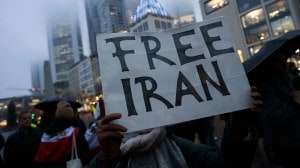US nudge: Take risks for peace
United States Secretary of State Colin Powell summarised Washington8217;s view of South Asia when he remarked that India and Pakistan must ...

United States Secretary of State Colin Powell summarised Washington8217;s view of South Asia when he remarked that India and Pakistan must both be prepared to take risks for peace. Addressing the annual meeting of the World Economic Forum at Davos, Switzerland, Powell said, 8216;8216;No American 8216;hidden hand8217; can remove the distrust between India and Pakistan. That they must do for themselves.8217;8217; He explained that the US had 8216;8216;extended a helping hand8217;8217; to both South Asian nations and was ready to do so again. 8216;8216;But it is crucial that they both take risks for peace on the subcontinent and work to normalise relations8217;8217;.
American decision-makers are tired of what they see as unending arguments between New Delhi and Islamabad. There is constant repetition of well-entrenched positions and rhetoric that sometimes acquires absurd proportions. If rhetorical statements had the same impact as nuclear weapons, the two countries would have destroyed each other several times over in 54 years.
Take for example the statement by Defence Minister George Fernandes, warning that Pakistan would be 8216;8216;erased from the world map8217;8217; if it used nuclear weapons against India. His apocalyptic threat followed remarks by General Pervez Musharraf about 8216;8216;unconventional war8217;8217; with India, which Pakistani officials have subsequently tried to play down as not being a reference to nuclear weapons. But threats of annihilation only aggravate the tensions and fears that have been built in into the South Asian dynamic since 1947. Indo-Pakistani politics in the 21st century still has the same flavour as pre-Independence politics in British India of the 1940s.
The risks Powell is inviting India and Pakistan to take is to break that mould and recognise the no-win game both states seem to be engaged in. His remarks came soon after a State Department spokesman declared that infiltration by Islamic militants from Pakistani-occupied Kashmir into Jammu and Kashmir had increased again. The US Ambassador to Pakistan, Nancy Powell, made the same point when she told a Karachi audience that Pakistan must not allow itself to be used as a 8216;8216;platform for terrorism8217;8217;. Although Nancy Powell8217;s remarks were meant to be subtle, they provoked a reaction in Pakistan in keeping with the South Asian tradition of political exaggeration. But the Foreign ministry protested her remarks and hard-line politicians called for her expulsion.
Colin Powell is considered a voice of moderation in an otherwise muscle-flexing US administration. Ambassador Powell no relation of the General, of course is a professional diplomat known for caution and competence. She and her predecessor, Wendy Chamberlin, can be credited with re-building US-Pakistan relations after a decade of sanctions. While the financial benefits of an alliance with the US are subject to policy reversals, those unwilling to make those changes have pounced on the US envoy8217;s comments as reflective of a 8216;tilt towards India8217;.
At the height of the Cold War, Pakistani leaders sought security against India through treaties with the US. This relationship served Pakistan well in terms of securing better weapons systems and substantial economic aid. But a rather romantic notion of what the treaty relationship meant resulted in disappointment. During two wars with India, the US did not help Pakistan though in 1971, President Richard Nixon8217;s tilt saved West Pakistan from a full-scale invasion after the fall of Dhaka. Pakistan suffered because its leaders failed to analyse the situation correctly, created false expectations and then got bitter over disappointment.
Through the statements of its secretary of state and the ambassador in Islamabad, the US is only trying to remind Pakistan of what Washington sees as Pakistan8217;s interest. The US remains concerned about nuclear and missile proliferation, Indo-Pak relations, fundamentalist militancy, Afghanistan, and the economy. On most of these issues, there is a stated Pakistani position and international conventional wisdom. It is time, perhaps, to bridge the gap between the two. Foreign policy is not only having a wish list in dealing with other nations. It also involves understanding what other nations want from you and to what extent will they go to secure it.
The global war against terrorism restrains Pakistan8217;s ability to persist with its policy of supporting Islamic militancy in Kashmir. The US is likely to keep up the pressure on its ally to close the militancy option completely. Assessments by US intelligence, rather than Pakistani denials, will determine the level of US pressure on Pakistan over this subject.
India has considerable advantage at present over Pakistan in almost all elements of national power. It would be in India8217;s interest to help Pakistan gain sufficient confidence as a nation and feel secure enough that there is no need for conflict or regional rivalry as a means of nation building. The US is pushing this line of reasoning that requires both India and Pakistan to take a few steps toward normalisation of their bilateral relationship. But hype and denial rather than rationality seems to characterise Indian and Pakistani actions towards each other. General Powell and Ambassador Powell should brace themselves for more of the same, at least for now.
Husain Haqqani is a Visiting Scholar at the Carnegie Endowment for International Peace. Write to hhaqqaniexpressindia.com
- 01
- 02
- 03
- 04
- 05































